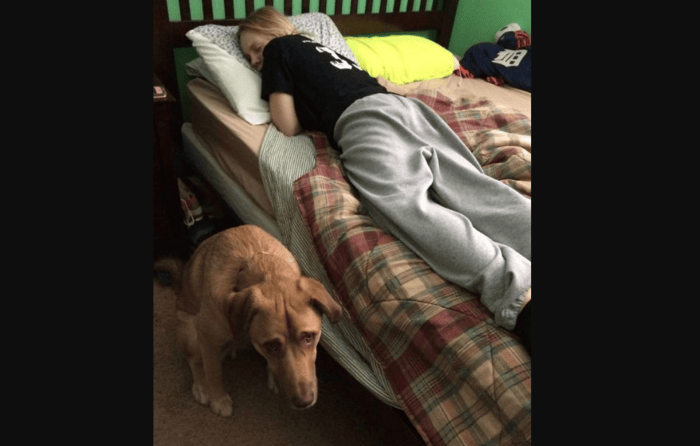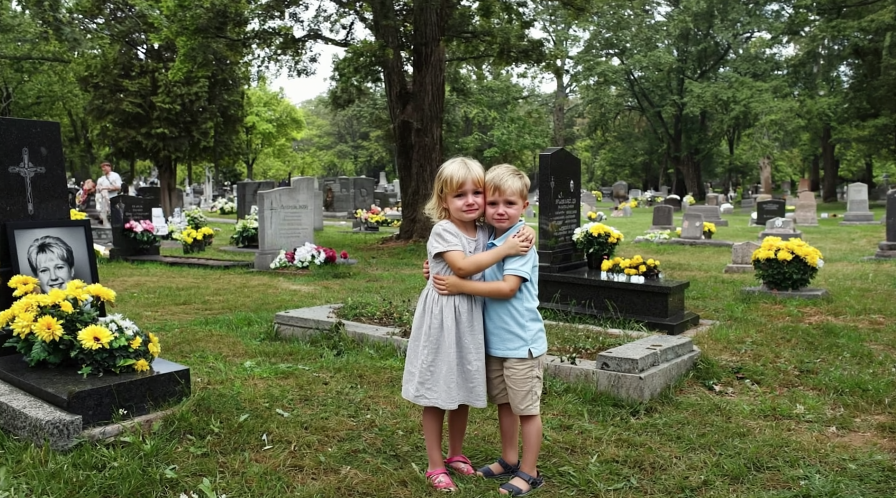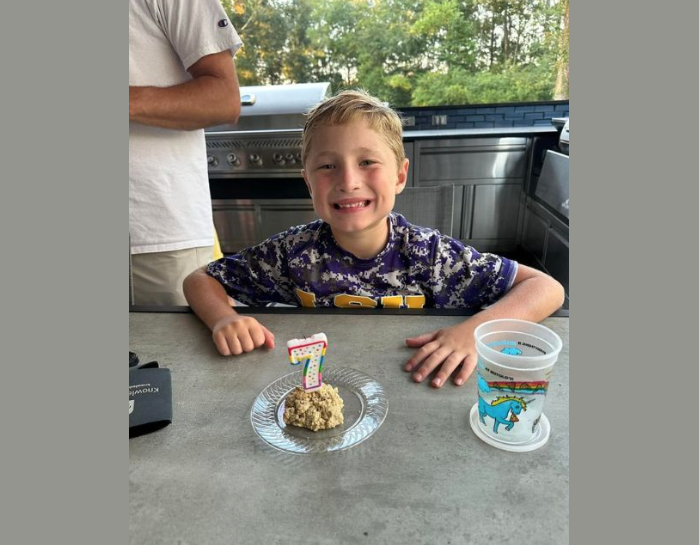I woke up to discover my dog staring intently at me—and then I saw the chilling sight that was hidden directly under the bed.
At first, I simply thought he just needed to go outside to relieve himself.
Murphy usually nudges me gently or paws at the edge of the mattress when he desires something specific. But that particular morning, he wasn’t moving at all—just standing rigidly, frozen in place, his ears slightly pulled back, his eyes locked onto my face as if he was desperately trying to convey an urgent message to me.
I groaned audibly and rolled over, still half-asleep, muttering something incoherent about “five more minutes of sleep.”
But then I suddenly realized something incredibly weird.
He wasn’t actually looking directly at me. Not precisely. His head was tilted just slightly… downward. Towards the dark, confined space directly under my bed.
I sat up abruptly and quickly, my heart already beginning to pound faster in my chest. Murphy didn’t move a muscle.
I whispered his name softly. He glanced at me, briefly, his eyes meeting mine, then immediately looked back down again.
I don’t know what compelled me to do it, but I swung my legs off the side of the bed, lowered my head, and slowly leaned down until my cheek was almost touching the soft mattress.
It took a second or two for my eyes to fully adjust to the deep shadows lurking beneath.
That’s when I finally saw it. Or—her.
A pair of wide, utterly terrified eyes stared directly back at me from the oppressive darkness. A young girl. No older than twelve, perhaps. Curled up tightly, like a frightened rabbit seeking refuge in a burrow, her small, trembling hands gripping the cold metal of the bed frame.
I yelped loudly and instantly jumped back so hard that I forcefully smacked my shoulder on the nearby nightstand. Murphy didn’t even flinch or stir. He simply stayed exactly where he was, staring intently at the girl.
I scrambled quickly to my feet, feeling profoundly confused and a little shaky from the shock. My voice came out sharp and cracked with disbelief. “Who are you, little one?”
The girl didn’t offer any answer. Her lips moved slightly as if she was attempting to articulate something, but no sound whatsoever emerged. She just looked… incredibly scared.
Not wild, not dangerous in any way. Just deeply, profoundly scared.
“Hey… it’s okay. I’m not going to hurt you at all.” I crouched down again, approaching her more softly and gently this time.
She still didn’t move from her hiding spot. But her eyes meticulously followed my every movement, and that felt like a significant indication of something.
Murphy cautiously inched forward and then sat down gracefully next to me. I immediately felt his comforting warmth by my knee. His tail wagged once. Slowly.
“I’m going to call someone, alright?” I said gently, not entirely certain who I meant to call at that precise moment.
As I reached out my hand for my phone, she suddenly whispered, her voice barely audible, “Don’t.”
I froze, my hand hovering in mid-air.
Her voice was barely there, a mere breath, but I distinctly heard it. And I heard the raw fear unmistakably woven into it.
“Why not?” I asked, blinking in confusion.
She nervously looked around the room, her small body visibly trembling. “He’ll find me,” she whispered.
That single phrase made the tiny hairs on my arms immediately stand on end with a chilling sensation.
“Who?” I pressed gently, my voice low.
She didn’t provide an answer.
So I made an impulsive choice. One I didn’t even fully comprehend or rationalize yet. I told her she could remain here. That I wouldn’t tell anyone about her presence. That she was completely safe here with me. And somehow… that simple assurance seemed to be enough for her to slowly, cautiously crawl out from under the bed.
She wore an oversized, baggy hoodie and mismatched socks. Her hair was severely tangled, and her cheeks appeared hollow and sunken, as if she hadn’t eaten properly in a significant while. She looked distinctly like she had been running—or perhaps hiding—for a very long time.
I promptly made her some warm toast and gave her a glass of cold orange juice. Murphy stayed faithfully close to her, as if he had known her for many years.
We didn’t converse much during that time. She didn’t even offer to tell me her name. She simply sat quietly at the kitchen table, holding the warm mug of tea I’d prepared for her, gazing out the window as if she expected someone to come crashing violently through it at any moment.
Later that same day, I called in sick to work, citing a personal emergency. Something about the entire situation felt far too delicate and fragile to interfere with.
Around noon, I gently asked her again, “Do you want me to call anyone for you? A friend? Your parents, perhaps?”
She shook her head quickly and vehemently. “They don’t know about this. They absolutely cannot know.”
I wanted desperately to press her for more information, but something in her eyes, a deep-seated fear, made me immediately stop.
Over the next two days, she barely ventured out of the guest room, except when it was time to eat. She slept a considerable amount, with Murphy faithfully curled up next to her like a fiercely loyal guardian.
The more I observed her, the more profoundly I realized how desperately she needed genuine help. Not the kind of help one typically finds in a bustling hospital or a sterile police station. The kind of help that fundamentally begins with establishing trust.
On the third night, just as I was peacefully drifting off to sleep on the living room couch, I heard soft, faint footsteps and found her standing silently in the hallway, tightly hugging herself.
“I had a brother once,” she whispered softly, her voice barely audible.
I sat up immediately. “Yeah? Tell me about him.”
“He used to tell me stories. About magical trains and cats that could fly through the air. Every single night before I went to bed.”
I smiled gently, a pang of sadness in my chest. “Sounds like a really cool brother, Nora.”
“He died last year. After that… things got much, much worse for me.”
That’s when she began to slowly tell me her story, her voice trembling slightly.
Her stepfather wasn’t who he pretended to be at all. Her mom didn’t believe her desperate pleas. So she ran away. She took a long bus ride, then walked for many miles, hiding in dark garages and under secluded porches. She had simply picked my house randomly when it started pouring rain outside. The back door, she said, had been unlocked.
I should have felt a surge of fear, or perhaps even anger, upon hearing this confession.
But I wasn’t. I just felt a profound sense of sadness and empathy for her.
“You’re not alone anymore, Nora,” I told her with conviction. And I truly meant every single word.
The next morning, she finally told me her name was Nora.
A few days later, I discovered an old, dusty guitar in the attic and showed her some basic chords. Her face lit up with an undeniable joy that I hadn’t witnessed before. She played for hours, humming softly to herself, lost in the music.
I called a friend who worked at a local youth outreach center. She promised complete discretion and came by my house, ostensibly just to “have tea” with us.
Nora genuinely liked her, a positive sign.
Bit by bit, we slowly started building something meaningful together. I formally signed up to become a temporary foster guardian for her. It wasn’t easy in the slightest. The mounds of paperwork, the intrusive questions, the long, anxious waiting periods. But I stuck with it, determined.
And so did Nora.
We joyfully painted the guest room together. She specifically chose a light blue color, explaining it was “like the sky on good days.”
Months steadily passed, marked by small victories and quiet moments.
Murphy never once left her side, a constant, comforting presence.
She started attending school again. She even managed to make a few genuine friends. She bravely joined the school’s art club, finding a creative outlet.
She still experienced bad nights. Occasional panic attacks. Disturbing flashbacks. But she slowly learned to talk through them, to process her emotions. Sometimes she would wake me up crying, and I would simply sit with her, just listening patiently.
One evening, approximately a year after she first appeared under my bed, she came home holding a small, shiny trophy.
“Second place in the school art show,” she said, trying valiantly to act casual about her achievement. But her wide, irrepressible grin clearly gave her away.
I proudly hung it on the refrigerator as if it were the prestigious Nobel Prize itself.
Then came the surprising twist I never, ever saw coming.
One afternoon, I received an unexpected phone call. It was from her biological mother.
She had been frantically looking for Nora for over a year. She explained that she had finally left her abusive husband. That she had absolutely no idea what had truly been happening until very recently. That she had only just discovered the extent of the abuse her daughter had endured.
I didn’t know what to believe in that moment.
But I told Nora about the call. Because it was undeniably her right to know the truth.
She didn’t say much in response. She just went utterly quiet, absorbing the news.
A week later, she tentatively asked to meet her mom. So we carefully arranged the meeting.
The encounter was slow, initially tense, but ultimately very real and honest. Her mom cried openly. Nora didn’t. Not immediately, anyway.
But a few days later, she started diligently writing letters to her mom. Then came the cautious phone calls. Then came the hesitant visits.
Eventually, after many months of careful, cautious steps and rebuilding trust, she courageously moved back in with her mom.
The house felt noticeably quieter without her. Emptier.
Murphy kept pacing into her empty room at night, looking genuinely confused by her absence. I knew exactly how he felt, sharing his sense of loss.
But the story doesn’t end there, not by a long shot.
A year after she left, I received a thick envelope in the mail. Inside was a recent photo of Nora, now taller and more confident, proudly holding a certificate from her school—it read “Student of the Year.”
The accompanying note read, simply, “Thank you for believing in me when no one else did. Love, Nora.”
There was also something else precious inside the envelope. A beautifully hand-drawn picture. It depicted me, Murphy, and her. Sitting together on the porch under a sky colored in a beautiful, light blue.
Now I proudly keep that cherished drawing in a frame on my desk.
Because some people enter your life from absolutely nowhere, and they leave an indelible mark you never expected. They profoundly remind you that doing the right thing—simply because it’s the right thing to do—can fundamentally change everything.
You don’t need a fancy cape or extraordinary powers to be a hero. Just kindness. Just patience. Just the incredible courage to truly listen when someone whispers, “Don’t.”
Life doesn’t always provide us with explicit warnings. Sometimes it simply presents us with profound choices.
That morning, I thought I was merely waking up to let my dog outside for his morning routine.
Instead, I woke up to an unexpected chance to profoundly change a life.
And in doing that, my own life changed irrevocably too.
Sometimes, the people who desperately need us the most aren’t the loudest or most demanding.
They’re just quietly waiting for someone to notice them. To ask. To genuinely care.
So if someone ever looks at you with the kind of desperate plea that Murphy conveyed to me that morning… maybe take a moment and just take a look under the bed.
You truly never know what kind of miracle might be quietly hiding there, waiting to be discovered.
If this story moved you in any way, or perhaps reminded you of someone special, please feel free to hit that like button and share it with a friend. You never know who might need to read this inspiring message today.




